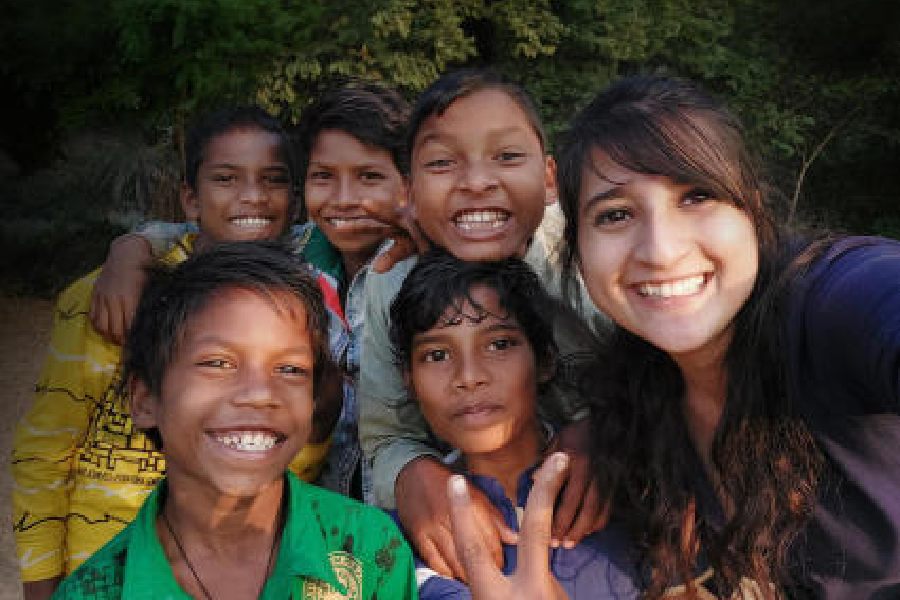A film about illegal and indiscriminate wildlife hunting in south Bengal has made it to the shortlist of the Jackson Wild Media Awards in Washington DC, billed as the “nature film’s equivalent to the Oscars”.
The 40-minute film, directed by Calcutta-born wildlife filmmaker Ashwika Kapur and produced by the philanthropic education platform Roundglass Sustain, is woven around five boys — aged between 10 and 13 — from a hunting community in a Jhargram village.
Between August and September 2022, the boys were given basic (second-hand, point-and-shoot) cameras to photograph the very same wildlife they habitually hunted in their backyards with catapults.
The transformation, depicted in the film Catapults to Cameras, was astounding. The kids not only discarded their catapults but also began to learn to recognise the beauty of nature around them, through the lens of a camera.
“The impact of our workshop went beyond the group of boys. At the end of the workshop, they put up a pop-up exhibition in their village of the wildlife photos they had taken. Most of their subjects — birds, monitor lizards, wild cats and the like found in the forests of south Bengal — on display were widely killed during festivals. Yet, the exhibition was attended enthusiastically by the whole village,” Kapur, an award-winning nature filmmaker and a science communicator, told this newspaper from Bristol.
Kapur is now a director with the BBC Natural History Unit in the UK.
The Jackson Wild Media Awards, an annual event celebrating the best in nature and conservation filmmaking, had over 500 films from 74 countries entering the competition in 2024. More than 200 international judges chose the finalists.
The film from Bengal has been nominated in the Impact Campaign Film category. A nomination here signifies that the film has transcended mere entertainment to become a catalyst for real-world change.
“The fact that a small story from a corner of Bengal can reach a global audience alongside major productions is a testament to the power of storytelling,” said Kapur, whose works have been on Netflix, and on National Geographic and Discovery channels.
The small-budget indie production is in direct competition with Apple TV’s Elephant Queens, US actor-filmmaker Robert Redford’s Watershed and We are Guardians, which is set in the Amazon rain forest.
The winners will be announced at the Jackson Wild Summit, in Washington DC, on September 5.
Blood sport
The film tracks the documentary and conservation initiative by Human and Environment Alliance League (HEAL), a Calcutta-based NGO at the centre of a crusade against hunting festivals in south Bengal.
Every year, thousands of men travel across the southern districts of Bengal to kill protected wildlife.
It is not a hunt for survival in the sense that the hunters do not depend on this wildlife for food or money.
“It is a blood sport targeting everything that moves. Some of the bigger animals that are killed are eaten. But many carcasses of dead animals, which are too small to consume, are simply discarded. These festivals are not tradition. They widely draw participants from non-tribal communities as well. These killings are for entertainment,” said Suvrajyoti Chatterjee of HEAL.
The film shows Kapur teaming up with Chatterjee and setting out to uncover the roots of hunting festivals.
Members and volunteers of HEAL track hunters across south Bengal during hunting festivals. Petitions filed by the NGO have led to significant court orders that prodded the forest department, police, railways and other agencies into action to bring the hunting toll down.
Calcutta High Court had in 2019 banned hunting festivals in south Bengal. On February 20 last year, a bench had said the indiscriminate hunting of wild animals “is as heinous and culpable a crime as the offence of murder”.
This newspaper has reported multiple times on the hunting festivals, held usually in the peak summer months, on specific days of the lunar calendar. The last one was held on June 22, when more than 130 birds and animals were slaughtered in a pocket in East Burdwan. Some of the clips have been used in the film.
“The scale of the festivals kept going up until the high court took notice of the killings. The coordination is often done by youths, who mobilise huge numbers of people through WhatsApp for the hunting expeditions. Large groups would move on trains with spears, axes, catapults and sickles,” said a Bengal forest official who requested not to be named.
“But now, there is a check on the movement of such armed groups. Checkpoints are routinely set up at different pockets on the days of the hunting. There is better coordination among different agencies tasked with curbing the menace,” he said.
Roundglass Sustain’s Samreen Farooqui, the executive producer of the film, said: “Communities are one of the pivotal pillars of our ideology. So, it was crucial that the film accurately reflects the realities on the ground without misrepresentation. We aimed to portray the hunting festivals for what they are — not traditional, not for sustenance but for hyper-masculine mass killings.”
For Kapur, the defining moment was to see children take part in the hunting sprees. “They were exposed to this masculine toxicity from such a tender age. But at the same time, we realised that there is no real tradition or commerce associated with these killings,” said Kapur.
In a world where conservation is often limited to seminars, lectures and workshops, the film is a beacon of hope.
“We were not preachy. It was an organic process. We appealed to the best
in people rather than chastising the bad in them,” said Kapur.










